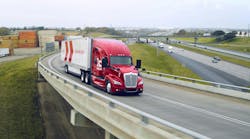A new study claims enterprise resource planning (ERP) systems used to manage the manufacturing, packaging, and transportation flow of many different kinds of goods may not be keeping up with ever-more complex demands being placed on those processes.
Enterprise software vendor IFS North America said a recent study it conducted revealed that current ERP systems may actually be leaving manufacturers with disjointed and inadequate technology and reducing enterprise agility.
“The fact that a manufacturer’s business model is no longer static – and instead changes on a fairly regular basis – has undeniable impact on what companies expect from a company like ours,” said Cindy Jaudon, IFS North America’s president and CEO. “Constant change of this magnitude can be extremely disruptive to a company.”
IFS found that more than 80% of respondents to its study of executives of mid- to large-sized manufacturing companies said their businesses are running multiple business models or manufacturing modes, but only 15% indicated their enterprise software adequately handles all of the different modes they are engaged in.
Of the 83% of respondents running multiple manufacturing modes, 76% are making products to order, 55 percent are making products to stock, and 34% are assembling to order. Respondents said that enterprise software like ERP was able to handle relatively simple modes like make to stock better than more complex, engineering-intensive modes like engineer-to-order, the company noted.
IFS’s Jaudon said this study – which also delves into “green supply chain” issues – is based on a survey conducted in December last year among more than 200 executives at manufacturing companies with more than $100 million in revenue.
“Our study data suggests that the ability to handle different modes is of critical importance given that manufacturers are adding modes of operation on a regular basis, as evidenced by the fact that 74% of respondents said they had added modes in the last five years,” she added.
“More than half – 54% – had added modes at least twice in that time, and 28% had added modes three or more time,” Jaudon explained. “Respondents said that acquisitions, new products, customer demand and market forces were all factors driving them to expand their capabilities into new manufacturing modes.”


